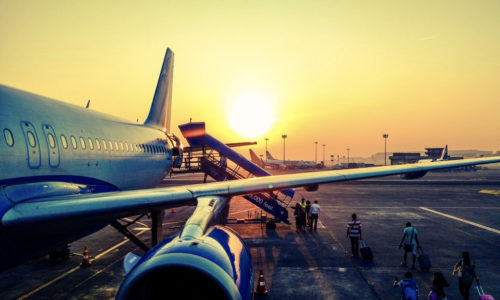Top five essential tips for travellers with high blood pressure

If someone is looking to travel with high blood pressure, a bit more planning and consideration to ensure a safe and enjoyable trip is required. According to the British Heart Foundation, more than 1 in 4 UK adults have high blood pressure, so whether someone is going on a weekend city break or looking to spend a week relaxing on a tropical beach, managing this shouldn’t hold anyone back from experiencing the wonders of the world.
To help with the preparations, here are five useful to prepare for the journey, stay healthy on the go, and handle any blood pressure-related situations with ease.
Tip #1: Talk to the GP before departure
Before jetting off on any adventure, a visit to the GP is essential for anyone managing high blood pressure. This pre-travel consultation ensures the health is in check and the blood pressure under control, making it a critical first step in the travel preparations.
Pre-travel check-up
A comprehensive check-up assesses if your condition is stable for travel and allows for any necessary adjustments. You should discuss your travel itinerary so that your GP can provide recommendations and advise what is best for your health.
If you take medication for your blood pressure, you’ll need to ensure you have enough for the entirety of your trip, plus extra for unforeseen circumstances such as delays with your flight home etc. Your GP can discuss how to handle your medication across different time zones if say you are flying long-haul and also provide you with doctor’s note detailing your condition and medication just in case you need to show this to your airline and security at the airport.
Travel insurance
No matter where you are travelling to and how long for, you should ensure you have suitable travel insurance. A comprehensive holiday insurance policy will cover health issues related to high blood pressure just in case anything was to happen when away. This is crucial for avoiding out-of-pocket expenses in case you need medical care abroad, enabling you to claim this back.
Whilst having a valid Global Health Insurance Card (GHIC) is also recommended for travel in the EU, it doesn’t replace travel insurance and will not cover you for all possibilities, such as lost or damaged items or repatriation back to the UK if necessary.
Tip #2: Keep medications accessible
Always pack your medications in your carry-on luggage to avoid any potential issues with lost checked baggage. It also ensures you have immediate access in case of delays or emergencies. It’s recommended to keep medications in their original packaging to avoid confusion and to help simplify airport security checks. Additionally, the label will have your name, making it easier to prove the medication is yours if questioned, to go alongside your GP letter.
Time zone management
Travelling across time zones can complicate medication schedules, especially for those that need to be taken at the same time each day. Plan ahead by discussing this with your GP as they might suggest adjusting your dosage times gradually a few days before departure to align with your destination’s time zone, or they might have other recommendations based on your specific schedule.
Flying with high blood pressure is generally fine if you have the condition under control and you will be safe to do so whether you take medication or not for the condition. However, this is why speaking to your GP before travel can ensure you are fit to fly. You can be more at risk of developing Deep Vein Thrombosis (DVT) due to the high altitude and lack of movement whilst on a plane, so regular movement is recommended such as moving your feet and legs while seated, along with walking up and down the aisle.
Tip #3: Monitor the blood pressure regularly
Maintaining regular monitoring of your blood pressure while travelling is crucial for managing your health. Here’s how to stay on top of it:
Portable blood pressure monitor
Invest in a portable blood pressure monitor as you will be able to take this with you. These devices are compact, easy to use, and a reliable way to keep track of your blood pressure levels wherever you are. Pack them in your checked luggage unless you’ve been advised by your GP to have this during the flight. You’re allowed to take medical equipment onto a plane if it’s essential. Whilst at your destination, daily monitoring can help you identify any unusual changes in your blood pressure, enabling timely adjustments to your routine or medication.
Recognising Symptoms
Typically, having high blood pressure rarely has symptoms you will notice, another reason why having a portable monitor is a good idea. It can lead to things like dizziness, headaches, or even blurred vision, but these are usually rare.
Regularly monitoring your blood pressure and being attuned to your body’s signals whilst on holiday can help you manage your condition effectively. This way you can address any issues promptly such as unusual symptoms, keeping your travel plans smooth and enjoyable. Note: If those symptoms include changes in vision, even minor ones, it’s a good idea to schedule an eye test when you return.
Tip #4: Stay hydrated and mind the diet
One of the common issues whilst on a plane is dehydration due to the dry conditions, which can lead to your blood pressure rising. To avoid this, ensure you are drinking plenty of water throughout the flight and avoid drinking too much alcohol and caffeine. Once at your destination and exploring, maintaining a balanced diet and staying hydrated are essential.
Hydration
Being in hot climates can lead to dehydration, so drink plenty of water each day and continue to avoid excessive amounts of alcohol and caffeine. Both of these can dehydrate you and impact your blood pressure levels. It’s a good idea to wear loose, comfortable clothing and
Dietary choices
Eating out frequently while travelling is part of the fun but can lead to consuming more salt and processed foods than you would like. This can increase blood pressure, so seek out fresh, whole foods when possible and opt for dishes low in salt. If you’re indulging in local cuisine, try to balance your meals throughout the day to manage your sodium intake.
Tip #5: Plan for rest and stress management
As much as travel can be exhilarating, it can also be exhausting and stressful which isn’t ideal for those with high blood pressure.
Plenty of rest
Avoid overpacking your itinerary. Whilst there maybe lots you want to see and you feel fine overall, ensure you have enough downtime scheduled for relaxation and rest. Being active is good, but adequate sleep each night is crucial for keeping your blood pressure in check and your energy levels high throughout your holiday.
Reduce stress
Travelling can sometimes be unpredictable, leading to stress. Learning a few basic deep breathing exercises can help along with some gentle stretching or yoga. Even practicing gratitude can help you feel more positive to combat stress triggers. These can be done anywhere and help maintain your calm, directly benefiting your blood pressure.
Enjoy the time away
So, as you can see, travelling with high blood pressure is entirely possible with the right preparation and mindset. With these essential tips in hand, you’re ready to enjoy your trip, knowing your health is as much a priority as your travel bucket list. The most important thing is to speak with your GP well in advance of you travel plans and they can advise the best way to manage this whilst away.
For more essential information about high blood pressure management, please visit The British Heart Foundation (bhf.org.uk).
The editorial unit





















Facebook
Twitter
Instagram
YouTube
RSS